 |
| |
The TO-SYN-FUEL consortium is delighted
to introduce its second newsletter edition.
This newsletter reports latest developments of the project carried out up to the summer of 2018. TO-SYN-FUEL will demonstrate a new, game changing, integrated process combining the highly novel thermo-catalytic reforming (TCR®), with hydrogen separation through pressure swing adsorption (PSA), and hydrodeoxygenation (HDO). This will produce a fully equivalent gasoline and diesel substitute (compliant with EN228 and EN590 European standards) and green hydrogen for use in transport.
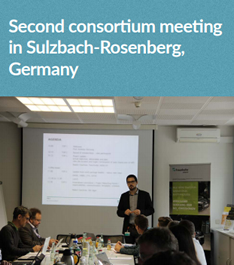
|
|
The consortium meeting was hosted by the project coordinator Fraunhofer UMSICHT at its premises in Sulzbach-Rosenberg, Germany, on the 25th of June 2018. Discussions took place regarding the progress of activities relating to the research project TO-SYN-FUEL which will operate and demonstrate the production of Synthetic Fuels and Green Hydrogen from waste biomass. During the meeting, some samples of TCR®-Oil from sewage sludge and upgraded TCR®-Oil were shown and their characteristics and properties were explained to the project partners. At the end of the meeting, a guided tour to the TCR®300 pilot plant was organised for the project partners. The pilot plant is within the commissioning phase at the moment and will be used to gain longterm experience from the process. These results will be part of the demonstrators design for the integration of TCR® with PSA (pressure swing adsorption) and HDO (hydrodeoxygenation) technologies for the TO-SYN-FUEL project.
|
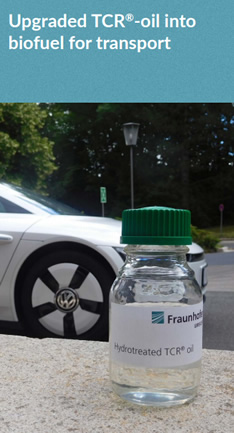
|
|
The project coordinator took the opportunity to present the limited production hybrid vehicle Volkswagen XL1 to the partners. This vehicle is diesel/electro driven, and is used for road applications and promotional activities on the production and utilisation of TCR®- Diesel – upgraded TCR®-Oil produced in Fraunhofer UMSICHT laboratories in co-work with project partner VTS. The TCR®-fuel development is also supported by the Bayerische Staatsministerium für Wirtschaft, Energie und Technologie (the Bavarian Ministry of Economic Affairs, Energy and Technology). TCR®-Oil produced is chemically similar to the lighter distillation fraction of fossil oils and is composed of highly deoxygenated aromatics such as benzene, xylene, toluene (BTX) as well as naphthalene. This bio-oil has favourable physical properties such as a low acid number, low viscosity, high heating value, low oxygen content, and low H2O content. Due to the low oxygen content and composition, the bio-oil is directly miscible with fossil fuels (diesel and gasoline) as well as biofuels (biodiesel, bioethanol and biomethanol) without forming emulsions and without the use of any additional surfactants. TCR®-Oil can be successfully hydrodeoxygenated, at elevated pressure using hydrogen and a specific catalyst, thus completely removing the impurities like oxygen compounds from the TCR® liquids to form hydrocarbons, which can be distilled to give diesel and gasoline equivalents as synthetic fuels for transport. This completely removes the need for blending with fossil fuels as the liquids obtained can be used directly in engines as a transport grade fuel.
|
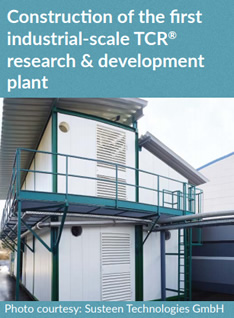
|
|
The first industrial-scale TCR® research & development plant achieved an important milestone with a successful 50 hours test run in May 2018. The plant processes up to 300 kg/h of dried sewage sludge and was built as part of a project for the demonstration of the energy-efficient conversion of sewage sludge funded by the Bayerische Staatsministerium für Wirtschaft, Energie und Technologie (the Bavarian Ministry of Economic Affairs, Energy and Technology) as part of their energy research program. The project also aims to demonstrate the use of TCR® bio-oil and syngas on an industrial dual fuel CHP plant and the gasification of char from sewage sludge. The project is conducted by the German waste management company Zweckverband Müllverwertung Schwandorf, the Institute for Energy Technology at the Amberg-Weiden University of Applied Sciences and Susteen Technologies GmbH. Susteen Technologies is responsible for the commercialization of TCR® technology. This project also provides valuable information for the TO-SYN-FUEL project in particular regarding the design and optimization of the TCR® reactor system.
|
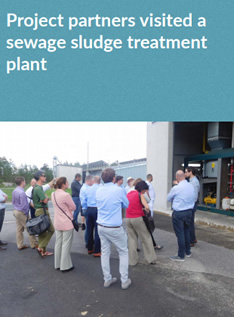
|
|
The project partners visited a sewage sludge treatment plant in Hohenburg, Germany, the 25th of June 2018. This plant locally dries and produces sewage sludge feedstock, currently 10,000 tons per year. Sludge driers at this scale are common in German infrastructure. Sewage sludge evolves from the anaerobic digestion of waste water to produce a digested ‘sludge cake’. It is a highly abundant waste with a yearly production potential of approximately 90 kg per inhabitant per year (wet basis). Germany therefore could potentially produce up to 2 million tonnes per year of sewage sludge on a dry basis. Similar to AD residues, there are increasing legislative demands imposed on the disposal of sewage sludge by landfill, landspread and incineration. Sewage sludge has shown great potential for being utilised as a fuel for TCR® conversion due to its availability, low cost and high energy content and fuel properties obtained from the bio-oil. Processing 2 million tonnes per year of sewage sludge into TCR® products would be sufficient to produce up to 200,000 tonnes per year of liquid transport fuels as well as up to 1.5 TWh of electricity and 1.5 TWh of heat.
|
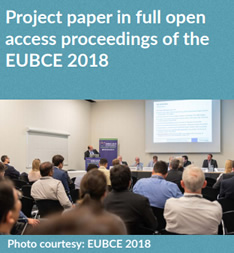
|
|
The EUBCE combines one of the world’s leading R&D conferences with an international exhibition, and represents the leading platform for the collection, exchange and dissemination of scientific know-how in the field of biomass. Andreas Apfelbacher, Fraunhofer UMSICHT, presented the project during the 26th European Biomass Conference & Exhibition (EUBCE), in May 2018 in Copenhagen. The presentation title was “To-Syn-Fuel: Turning Sewage Sludge into Fuels and Hydrogen”, with code 3DO.6.5. The related presentation paper is included in the conference proceedings. The EUBCE Conference Proceedings have a full open access policy. All submitted full papers of plenary, oral and visual presentations are published on-line in the EUBCE Conference Proceedings and are fully searchable and citable online as soon as they are published.
|
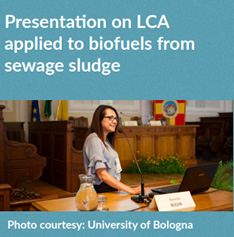
|
|
The aim of the 12th Italian LCA Network Conference, “Life Cycle Thinking, in decision-making for sustainability: from public policies to private businesses” is to discuss about the role of the LCT approach as a decision-making aid in the definition of strategies for sustainability, thus supporting both public and private businesses in making more informed decisions. Presented papers contribute to new approaches, methods and case study applications, in order to assess developments, current policy progress and pathways toward sustainability. Serena Righi, University of Bologna, presented the first analysis related to environmental performance carried out for the project. The presentation, titled “Life cycle assessment applied to biofuels from sewage sludge: definition of system boundaries and scenarios”, was displayed on the 12th of June 2018 at the University of Messina, during the session Waste Management.
|
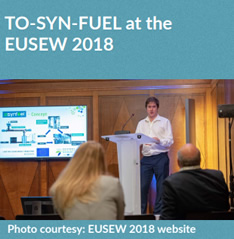
|
|
ETA Florence and WRG Europe, partners of TO-SYN-FUEL, presented the project at the Energy Fair and the Energy Talks of the Networking Village in Brussels on Thursday 7 June 2018 during the European Union Sustainable Energy Week (EUSEW). The Networking Village fosters information-sharing and new connections to promote sustainable energy innovation. It is an opportunity for participants and stakeholders alike to exchange ideas on policies and best practices, and a chance to lay foundations for future cooperation. The Energy Fair offers contributors the unique opportunity to showcase their activities with interactive presentations and dynamic discussions to a large audience. The Energy Talks invite engaging speakers to deliver speeches on innovative initiatives, followed by lively Q&A sessions with the audience.
|
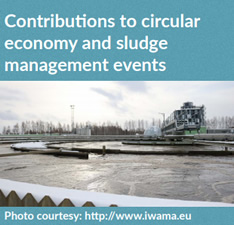
|
|
TO-SYN-FUEL project has been presented during the fourth workshop of the IWAMA project focused on smart sludge handling in the wastewater treatment sector. The event took place on 8–9 February 2018 in Tartu, Estonia. The presentation was during the session on new sludge handling technologies and case studies, with the title “Production of synthetic fuels and green hydrogen from sludge (TO-SYN-FUEL)”, by Nils Jäger of Fraunhofer UMSICHT.
Another contribution on the project has been presented during the session Sewage Sludge of the SUM 2018 / 4th Symposium on Urban Mining and Circular Economy held in Bergamo, 21 May 2018. The title is “Sustainable utilization of municipal sewage sludge into synthetic fuels”, by Andreas Apfelbacher of Fraunhofer UMSICHT.
|
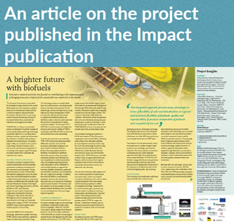
|
|
An interesting and useful open access article on TO-SYN-FUEL project has recently been published in the Impact publication in an understandable and accessible language to a wider audience of stakeholders, enabling widespread dissemination.
The publication and this article are also available open access on Ingenta Connect, the world’s largest online scholarly resource, used in 30,000 research and industrial libraries and with 1.5 million visits per month, to disseminate the project to a broad scientific community. You can view and download the article on Ingenta Connect here or in the section News of the project website www.tosynfuel.eu
|

The consortium with 12 partner organisations has brought together some of the leading researchers, industrial technology providers and renewable energy experts from across Europe, in a collaborative, committed and dedicated research effort to deliver the overarching ambition. Partners include: Engie Services Netherlands NV, HyGear Technology and Services BV, Slibverwerking Noord-Brabant NV (The Netherlands), Fraunhofer UMSICHT, Verfahrenstechnik Schwedt GmbH, Susteen Technologies GmbH (Germany), Alma Mater Studiorum – University of Bologna, ENI SpA, ETA–Florence Renewable Energies (Italy), University of Birmingham, WRG Europe Ltd (UK) and LEITAT (Spain).
The project has a total duration of 48 months from May 2017 to April 2021 and will be funded by the European Union under the Horizon 2020 programme.

Contact Point Fraunhofer UMSICHT:
Dr.-Ing. Robert Daschner, Project Management Team
Email: robert.daschner@umsicht.fraunhofer.de, phone: +49 (0) 9661 908-410
Contact Point ETA-Florence:
Ing. Stefano Capaccioli, Project Dissemination Team
Email: stefano.capaccioli@etaflorence.it, phone: +39 055 5002174.
www.tosynfuel.eu | @tosynfuel

|
|
This project has received funding from the European Union’s Horizon 2020 research and innovation programme under grant agreement No 745749.
|
Disclaimer
The content of this newsletter cannot be considered as the European Commission’s official position and neither the European Commission, TO-SYN-FUEL project consortium nor any person acting on behalf of these organisations is responsible for the use which might be made of it. Although TO-SYN-FUEL project endeavours to deliver a high level of service, no guarantee can be given on the correctness or completeness of the content of this newsletter and neither the European Commission, TO-SYN-FUEL project consortium are responsible or may be held accountable for any loss suffered as a result of reliance upon the content of this newsletter.
|
|
 Printable version
Printable version
|
|
|
|
|
|
| |
|
